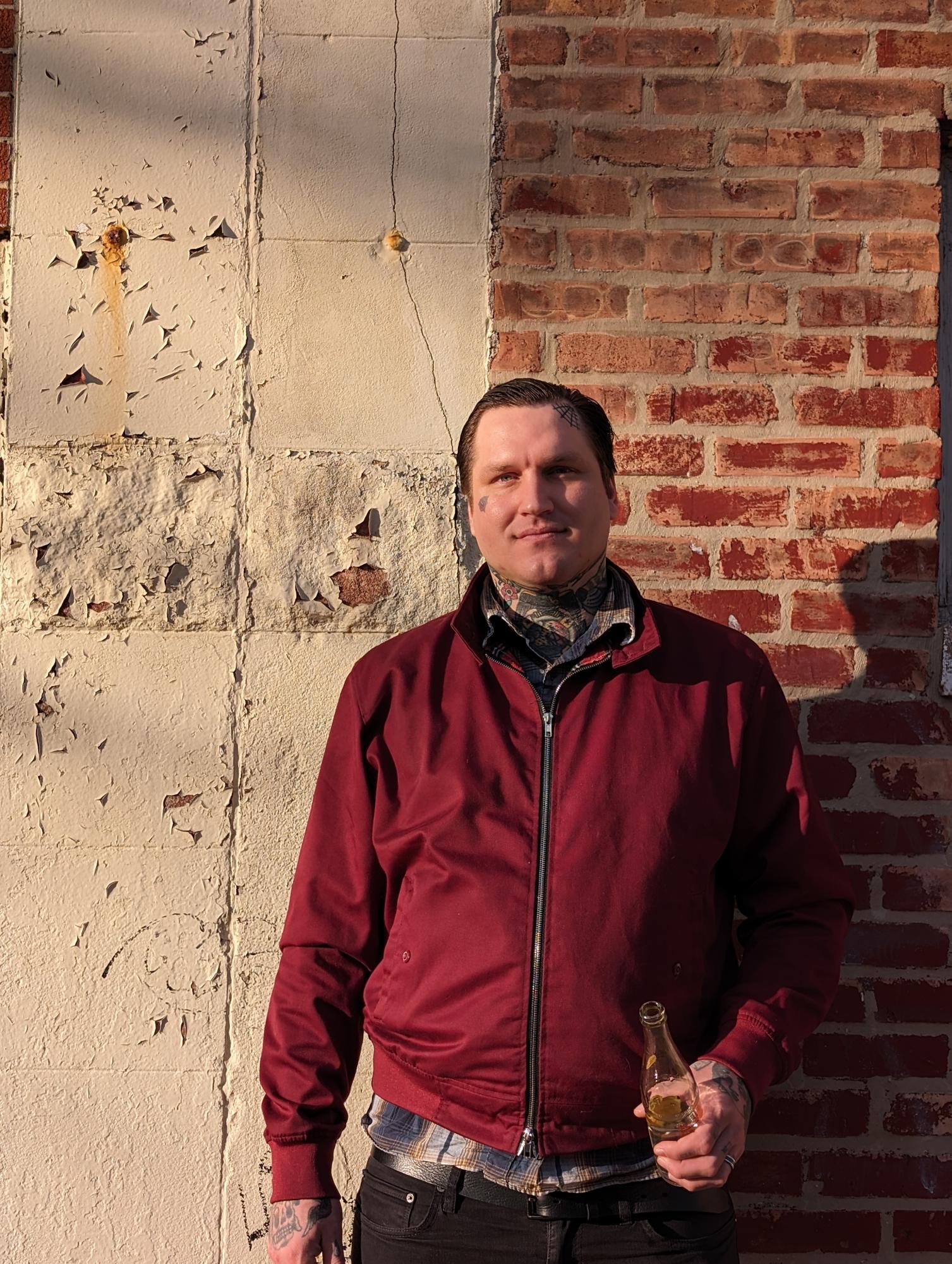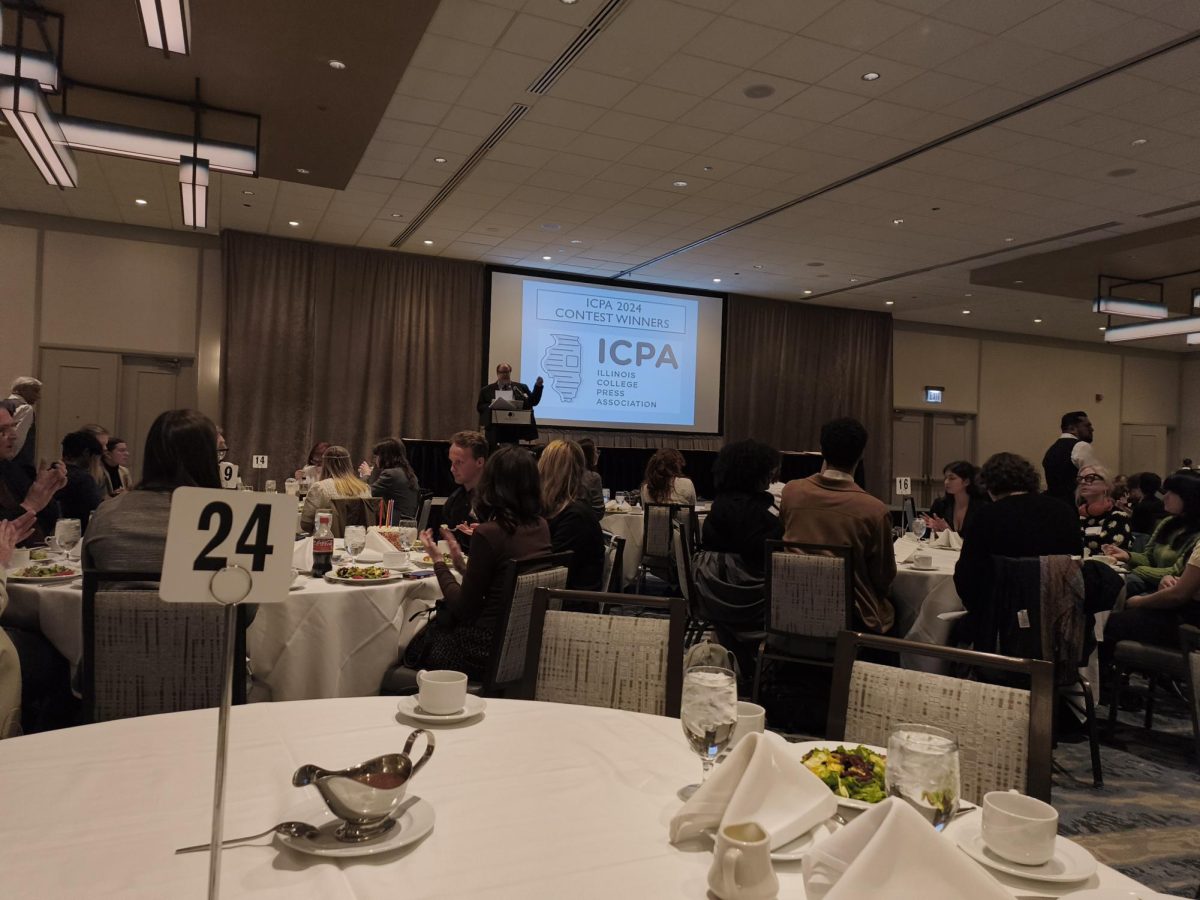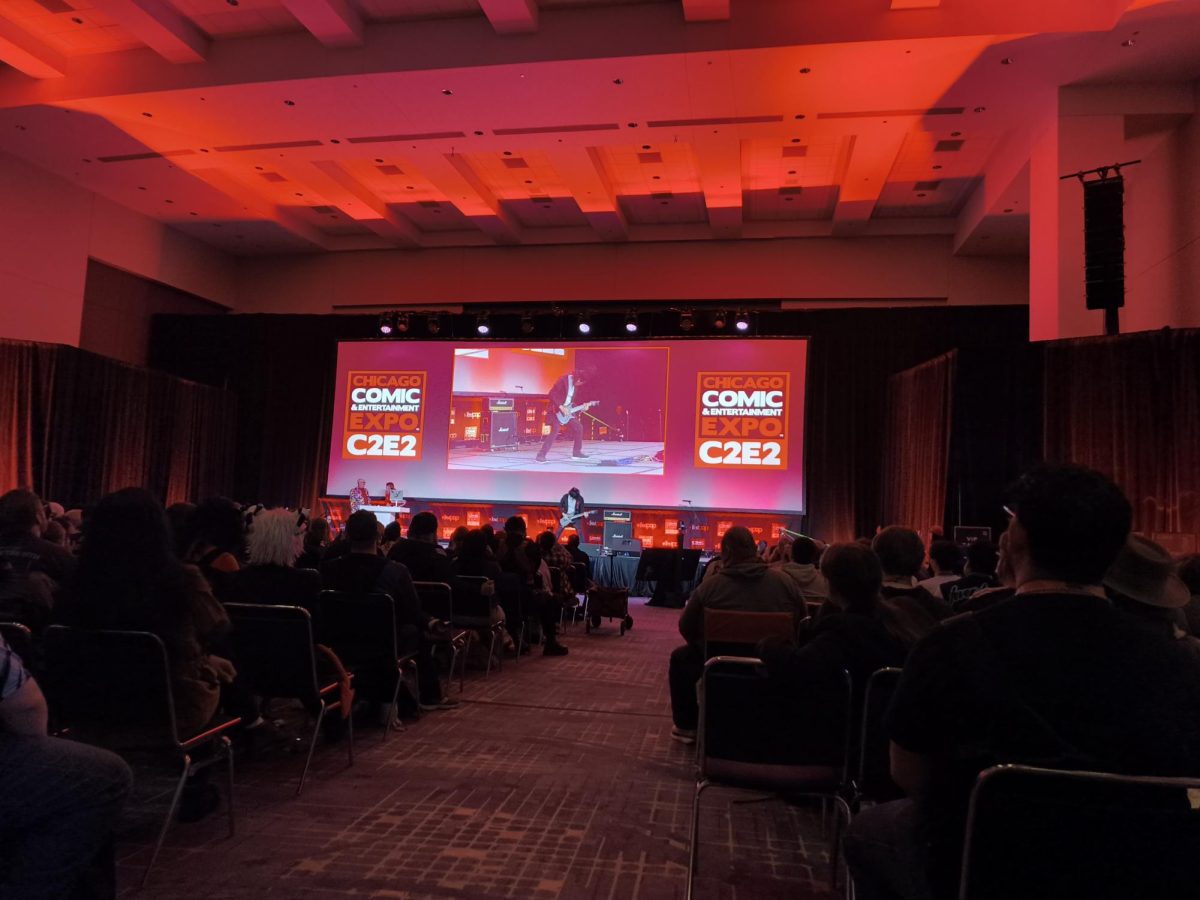Several weeks back, in the English Department’s Writing & Literature Collective, we were informed that an NEIU student would be joining our Feb. 8, 2024 discussion to read some of his newly published novella, “The Magpie Funeral”. With such a tender name, and based on what seemed to be emotional, culturally exploratory subject matter, I would not have guessed the 34-year-old, Dallas/New Jersey/Connecticut native, Adam Galanski – De León to appear as he did.
A tattooed and imposing figure, Adam joined our little group professing his nervousness and unfamiliarity reading his work in public settings and asked that we bare with him. This was an easy task, however, despite his nerves, he delivered clever, physical, enrapturing prose that left us all wanting more, and left me wanting to be his friend.
A week or so later – after excitedly reading all the work of his I could find online – we met for coffee and a chat.
This interview has been edited, shortened and reorganized from its original format, where necessary, to increase efficiency (mostly in my own questions).
Zachariah Simmons: How long have you been a student at NEIU and what made you come back and join an English program despite being an author on his way to success?
Adam Galanski – De León: Since Summer 2023. And to hopefully get some more secure vision of a job. I’ve worked a million shitty jobs in my life and I’d like to work something more comfortable. I want to do something with a degree that maybe isn’t so physical, where I still have time to write. Also, NEIU has given me texts to analyze and techniques to use, like in Julie Kim and Tim Scherman’s classes. Not just analysis, but shifts of perspective, the context of writers. It’s helped me to read broader. I feel like I’ve developed better skills being at NEIU.
Z: Did you struggle to take school seriously as a younger person?
A: Yeah, especially since I had jobs in bars, and I had problems with alcohol, and I have OCD. When I was younger, it was debilitating, overwhelming, I could hardly stand simple, social interactions. When I was right out of high school, I was barely a functioning human being. There were just so many failures to launch. Now, I have a better respect for it, and I’m all about prioritizing school over social things and feel that I’m actually ready for school this time.
Z: I read a lot of your short stories, like “Cats and Dogs” and “Gynecomastia”, that are filled with menace and vulgarity, from male perspectives. Then I read “Matryoshka” which is from a woman’s perspective and is very subtle. You write both so well, how do you choose the tone?
A: I’d say a lot of it comes after the subject matter. Stories, like Cats and Dogs are loosely based on actual experiences from when I was younger. Those grittier stories, I take a more straightforward approach to. Something like Matryoshka is more of a story that I came up with myself, less an inspiration from real-world things, though I collect Matryoshkas. So I had the idea of someone who saves their money inside of those. And I also wanted to tell the story of how generations interact with each other. That’s something that I’m doing in The Magpie Funeral, too.
Z: In your writing, there’s often precise visual and auditory details and also a capturing of physical movement, what is your process in creating that?
A: Something I’ve been consciously focusing on is having flow in the story, especially through the language. Not just describing things, but doing so with meter and rhythm. I’d say a lot of it comes from actual lyricism. I wrote poetry, lyrics for bands for years and then I found authors that I really like that do that. Like the Catalan writer Irene Solà. She wrote this book, “When I Sing, Mountains Dance” and lyrically, the prose is everything I wish I could do with “The Magpie Funeral.” It’s folkloric and it’s got so much movement in the way it talks and it’s kind of what I’m striving for with my writing going forward.
Z: What do you see as the role of art in informing pop culture, culture in general and how do you see artists fitting into the broader societal narratives?
A: I’d say a lot of mainstream things today come from subversive ideas or sub-cultures from the past. If you look at the music scene, I think some of the music movements of the early- and mid-1900s have drastically changed the effects of popular music today, and I’d say the same with a lot of writing. And for me, I’m reflecting what’s around me. With the novel I wrote, “Szarotka,” from the perspective of a factory I actually worked in, I try to keep an accurate reflection of the world, while also creating imagination, and using themes from my own life, like family. With the new novel I have coming out (“Szarotka”), it’s heavily based around the guy’s relationship with his mother and regrets surrounding that and I think I have that in my life too. There are details that are completely fabricated and things that reflect the world. But my outlook has changed over time. Like with the punk scene, it was a lot of people drinking and doing drugs and I don’t connect with that part of that scene anymore. I’d rather connect with the message and use that in other aspects of my life.
Z: Do you find the vulnerability of having to show something true to yourself in your art, uncomfortable?
A: Yeah, definitely, especially when you don’t know how someone’s going to react to it or connect with it. That story “Gynecomastia,” is personal because I had experienced that when I was very young. And in my family, medical issues or anything sexual or religious, was extremely taboo. If I had any sort of issue, I didn’t bring it up to anybody, I just made my own superstitions about it. This is a kid who is experiencing something completely made of him, that’s never been explained. A child’s mind wonders to all these different vulgar possibilities of what his life could be. And that is something that I felt at that time, and something I never even talked about to my closest family members. That’s probably the most vulnerable story I’ve written. Still, it’s something that’s hard to show to people. But I’m glad I wrote it because it feels now like a buried memory, and It’s cool to face something like that. It’s good to face hard memories head-on.
Z: Given your growth as an author (being published, etc.) are you feeling any external limitations or pressures?
A: Not too much. I did have a novella in an anthology and the editors really chopped it up and squished around the meaning of the story. It was a bummer for me at the time, especially because I was new to publishing and I didn’t stand up for myself or for my voice. But the places that I publish through now, like Querencia Press, and Kansas State University are super into author autonomy and they’ll suggest things but I don’t necessarily have to take them which is a nice part of publishing in independent and university presses. I’m in talks with a literary agent and we’ll see how that plays out because they might push me in a certain direction. But we’ll see, I’d still like to be able to advocate for myself. I think with the business side, things can go either way. That was my experience with the music too. Putting out records when I was younger, I started to subconsciously tailor myself to what I think people want to hear.
Z: Are you worried about having to become a part of that business end of art?
A: Sometimes I don’t even really think about it. Usually, I’m just happy that people have published my work and I’m content, in many ways, to just be kind of a quiet voice. If I could get it distributed more that’d make me happy. I think when I was younger and was playing in bands, I had these pipe dreams and I got a dose of reality early on, so coming into this, I don’t really have any expectations. I’d like to hold a physical book in my hand and I’ve got that already, so just keep doing that for now.
Z: You mentioned your novel “Szarotka” was written in second person point of view, what moved you to do that?
A: When I was young, I read a lot of those old shitty sci-fi books from the eighties. There were some that were written in second person and I wanted to do that for a long time. Then, I read Patrick deWitt’s “Ablutions.” I worked in the service industry, bar security, bartending for 12 years, and that book is about a writer who’s a degenerate bartender and I obviously connected to it. But he wrote that in second person, like he was taking notes, trying to remind himself of everything he’d done. When I read that, I felt confident to try and do it myself. But a lot of places that actually liked my novel rejected it because it was in second person. They said, most people who read literary fiction aren’t going to want to read something in second person, but I wanted to keep it that way. Then when I entered the novel competition through Kansas State University, they loved it. The MFA program at KSU took the novel and edited it, giving me suggestions about plot, character, creating more nuances which was probably the most helpful advice from an editorial group I’ve received, but they kept the second person.
Z: You mentioned that you had a long span of writer’s block. How did you end up there? And then, how did you extricate yourself from that?
A: When I was young, I was super impatient. I just wanted things to happen right away, which was an immature attitude to have. I was sending stuff out a lot and writing every day and just being discouraged all the time. I finally wrote something I was proud of, and I sent it to a friend, this author I had become pen pals with, Patrick Michael Finn who advocated for the work to his publisher. Then, after two years, I just got back a two-sentence formal rejection. I was so frustrated with how shitty I was doing at things and I was like, “You know what? I’m just going to focus on music.” So it took me like six or seven years. I played in bands, I went on DIY tours, put out records on Indie labels. Then it was around the pandemic when I read this book called “Burden of Concrete” that was a memoir of this punk rock guy from Seattle, who had been in and out of prison for 10-15 years and in the end he had a connection to a friend of mine, and reading that someone who I had a personal connection with was doing this inspired me to start writing again. The life experience I had gained was enough to handle it with maturity, to be more patient with it. That’s when I started having more successes.
Z: You seem to be pretty regimented in your reading and writing. Do you have keys to finding motivation?
A: Usually if I can’t write something, I’ll just read. A lot of the writing process is not writing, it’s having experiences in the world, whether it’s conversations or hearing someone else’s conversations or just going somewhere. You pick up the ways people interact, how things look around you, or even just having the time to sit in silence and let yourself develop something. I used to get an idea and then sit down and write stuff right away, and it always came out forced. Really taking my time, maybe even not writing for a little bit, but instead focus on reading different books, trying to expose yourself to new voices and tools.
Z: I remember you said you intentionally sought out non-American authors, how has that been helpful to you?
A: It’s a completely different way of looking at the world and writing. You look back on high school and realize you only got male European or American writers. My interest in reading a lot of translations was to read people who had completely different upbringings and perspectives and social histories than me. But also, you get to see how different cultures look at writing techniques. Like the book “The Adventures of China Iron” by Gabriela Cabezón Cámara and the way it deep dives into nature and landscapes really influenced “The Magpie Funeral.” Reading many various voices can really build up your toolbox
Z: I haven’t interacted with you and your wife, Ayanni a ton, but you seem to have a very supportive relationship; is that something you lean on?
A: It’s been an extremely close relationship. We feed off of each other’s passions. She writes poetry, I write fiction; we both wanted to go back to school; we both want to get English degrees. Even before we were together we were in similar social groups and it’s cool how we’ve converged.
Z: What has been your family’s response to your writing, your success?
A: They’ve been really positive. It’s been a good feeling because, when I was younger, the things I was creating didn’t have such a positive resonance with family members, to the point where relationships were strained a little. Going back to school and having some successes in a way healed a lot between us and allowed us to develop more intimate, emotional relationships with each other again. And my in-laws, they’ve been supportive since day one with literally everything I’ve done, they’re some of the most caring people I’ve ever met.
Z: What advice would you give to a young writer struggling to write?
A: Just finish something. Maybe they haven’t found their style or voice, but it just comes with a lot of repetition. Don’t feel pressured to use everything because there are pages and pages I have written that I don’t even have anymore, that I’ve deleted, but it doesn’t matter, it all adds to your skills.
Z: This is a jovial question, but do you think you’re receiving any favoritism in your classes?
A: I was actually worried about that at first, that’s why I didn’t really want to mention it to anyone. But I don’t think I’m getting better grades for it. What I do think it helps me with is making better relationships with the professors.
Z: Did you choose a smaller university on purpose?
A: Well, I would rather go to a smaller school. And it’s better financially than a lot of the big colleges downtown plus my mother-in-law went back in the 2000’s and only had good things to say about it. The classes are small, Julie Kim’s class has only about 6 people in it and we’re in constant conversation with each other, picking up ideas. The English department is really a close group of people, and I really appreciate that. It feels like you’re getting more for your money’s worth; you get more attention, and the work you can put in allows you to have a voice in the classroom.
Z: Given that you’re in school and pursuing writing, how do you balance the workload?
A: In the past when I wasn’t in school, I was able to regiment it more: go to work, come home, write, go to sleep, wake up, get everything else done. But now, going back to school, getting married, I just find the cracks in the day where I can do things. And, Ayanni has a class and during that time I will dedicate it to working on short stories or just having that little void where I can think.
Z: In a world full of distractions do you struggle with any?
A: One of the hardest things for me to get past are my OCD tics. When I’m physically engaged in something, like right now, I won’t have an issue, but if I’m reading, writing, I’ll have issues with ticks surrounding numbers or patterns and it’ll take me out of whatever I’m doing and it takes a while to get myself un-anxious again. Now, I just get myself to the quietest place possible where I can actually hear myself think. Also, getting older, finishing school finally, doing cool stuff with my life like writing, this has helped me.
Z: Have you had any difficulty accepting yourself when creating art?
A: I think I initially internalized a lot of negative family and teacher interactions and any time I ever did anything creative, I felt unworthy and I dealt with a lot of imposter syndrome. But having works published, having my book coming out helps a lot, and also having the support system from my family, my in-laws has healed a lot of that. Even teachers and fellow students getting excited about my work has been really great. Having that community at NEIU to lift each other up, it’s a big deal.
Adam Galanski – De León is a brilliant writer, a deeply thoughtful individual and undoubtedly a success story of NEIU. It was a true pleasure to speak with him. His novella, “The Magppie Funeral” is available for purchase now through Querencia Press, and his forthcoming novel “Szarotka” is the winner of the 2022 Buffalo Books Prize for Fiction and will be published in the summer of 2024. His entire catalog can be accessed from his website alongside some astonishingly impressive photos of the artist.






Adriana Mroczka • Apr 2, 2024 at 10:52 pm
Adam is definitely brilliant and the nicest, wisest, young man you’ll ever meet. I can’t wait to see and read his future stories.